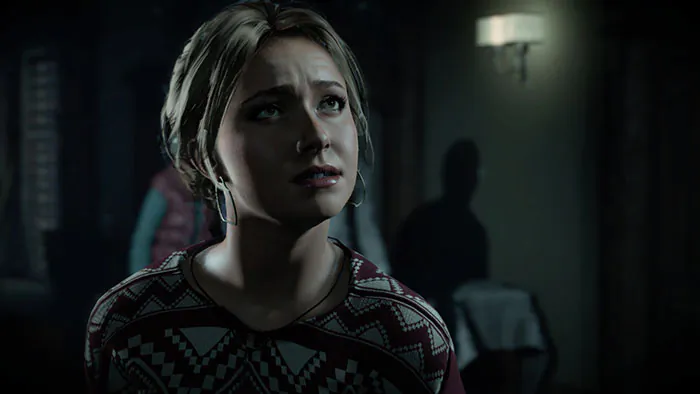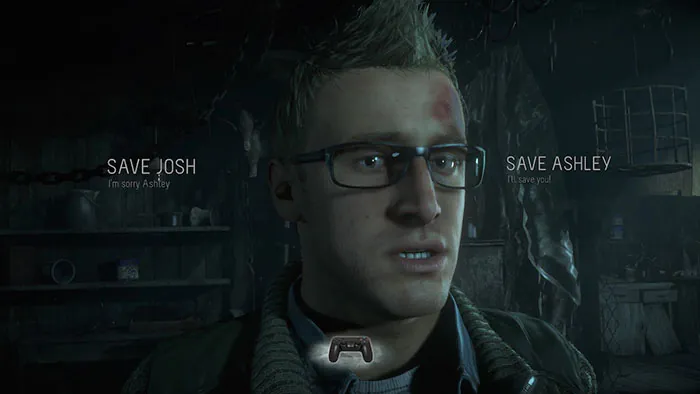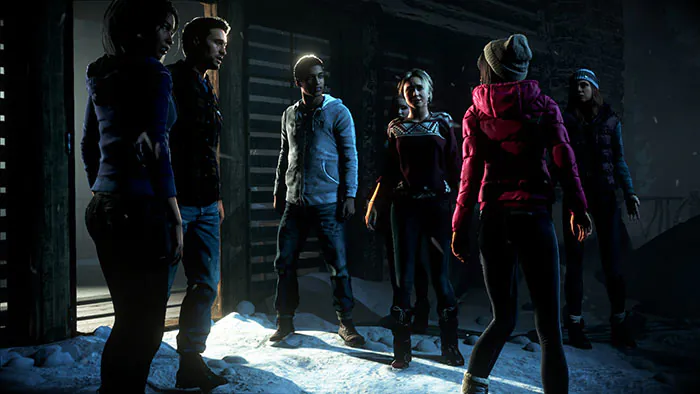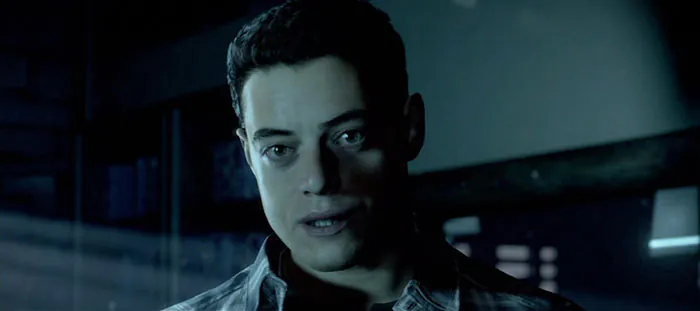© ROOT-NATION.com - Use of content is permitted with a backlink.
The horror genre has never been this popular. Maybe because of modern graphics or maybe we have one particularity shouty swede to thank, one thing is clear: in our times of powerful consoles and virtual reality it’s easier than ever to engross gamers and make something really scary. I wasn’t surprised upon hearing than Sony had been creating their exclusive horror – it was long overdue. And so I among other gamers started waiting for this miracle of technology: we were promised an interactive movie (a game subgenre Sony just can’t leave alone) with great actors, great visuals and even a VR DLC. Everything about the project screamed success, but as The Order 1886 taught us, there’s not guarantee for victory in game industry. And while Until Dawn is nowhere as disappointing, it still has a lot of problems.
When I first started playing, it all looked like an ordinary horror with traditional clichés and tropes. And while it looked pretty standard for a movie, games usually take a different path. The whole ensemble of characters, all voiced by accomplished actors and a first-rate graphical engine seem a bit out of place nowadays, when most interactive horrors are made by indie studious. This is, in fact, a full movie with all necessary ingredients, And while it is cheesy and predictable, a lot of people may get a kick out of it.

When I first started playing, it all looked like an ordinary horror with traditional clichés and tropes. And while it looked pretty standard for a movie, games usually take a different path. The whole ensemble of characters, all voiced by accomplished actors and a first-rate graphical engine seem a bit out of place nowadays, when most interactive horrors are made by indie studious. This is, in fact, a full movie with all necessary ingredients, And while it is cheesy and predictable, a lot of people may get a kick out of it.
But not everything was taken from movies – a lot of games got “copied” as well. Especially other Sony exclusives like Heavy Rain from Quantic Dream. I hear a gasp – yeah, QTEs are back, even though pretty much everyone knows this is an outdated and plain bad technique. But don’t despair – it’s not all bad. Not at all – it fact, I was pleasantly surprised by the game’s sudden depth. I was skeptical, and some of my skepticism turned out to be unfounded.
Until Dawn is an ambitious project – no doubt here. The developers wanted to create an interactive horror movie where every character can be controlled. There were times when this idea along with some awesome set pieces made me fall in love with this game. But a lot of other times I felt something completely different, thanks to uneven direction, lazy dialogs and QTEs, which I hate so very much.
In terms of story, it starts in classical fashion: a group of teenagers decide to spend some quality time in British Columbia, where there’s a particular creepy cabin in the mountains. Obviously oblivious to one of the most popular horror movie elements, they embarked on their fun weekend until one silly prank went horribly wrong. The result: two sisters missing, presumably dead. But one year passes and here they are again – preparing to celebrate the lives of their late friends. You just know it’s gonna end badly.

Until Dawn is slow in the beginning, where exposition is the main focus. We get to know our characters and their backstory. Nothing scary happens in the first hours (not counting the intro) where it’s mostly talks and walking. I can understand why it starts like that: there are a lot of characters, and we have to know something about them. On the other hand, there’s not much to learn since all of them are walking clichés – archetypes we’ve grown to know all too well thanks to usual teen horror flicks. Even long talks and good actors can’t make them seem alive.
So, who are some of these people? Mike and Jess are a popular couple of successful kids, whose sole interest here is to find a quiet place to have sex. Chris is a nerdy guy with glasses and that’s all you want to know about him. Sam is a lone wolf with strong survival instincts. You can make these characters develop and change, but in the end there won’t be any surprises – they are bland and uninteresting.
While boring characters are bad, they offer a unique opportunity to make them less so. It is a game, where we can tell them what to do, after all. So I went and tried to make all their actions as much out of character as possible. Let jerk be a nice guy and vice versa. It’s interesting to break a story like that. Mostly I played with Matt – a jock with a good heart. There were some scenes where my actions changed the relations between characters. I tested the game and yes, depending on how I act others reacted differently. Couples can be broken up, friendships ruined. I was fairly impressed, especially after disappointing RPGs which absolutely butchered the aspect of choice. Here it’s back – an unexpected, but pleasant surprise.
My Matt was constantly arguing with Emily and reacted negatively to everything she was saying, In the result, she hated my guts. It was obvious from little things and her overall behavior. I could’ve reacted to her differently which would have resulted in a different relationship. All of that impressed me – they really tried to make my actions count. It wasn’t an empty promise after all. It is, in fact, an interactive movie.

But you can do much more than change relationships. In fact, all lives depend on your success. Every single character can die or survive. One little mistake and its game over. You can’t restart and try again – the game supports only autosave, so every action is finite. Want to try something with a different outcome? Start all over. This is very important, and while I despise autosave, I can understand why it’s there. I was actually scared for my characters, knowing that at any time they can be killed and there won’t be anything I could do. Unlike Dark Souls, I can’t “learn” techniques and try again – when someone’s dead, they’re dead. In the end, most of my guys were brutally murdered.
As I said, the idea behind it is solid and understandable. But the execution is more than flawed. The thing is, not all deaths seemed fair to me. I mean sure, if someone ends up being dead because I wasn’t careful enough, it’s fine. I can blame only myself. But oftentimes I couldn’t do anything and it seemed like pure luck. QTEs are brutal and require perfect reaction. One or two mistakes often result in death. And be sure: every suspenseful scene is done with QTE. There’s not escape from it – it is the ultimate villain. But the game does not stop here – it actually reinvents QTE and makes something even less fair: in some moments the game wants the characters to be quiet and motionless, and that can be accomplished by holding the controller completely still. One little tiny movement and its game over.
The system is completely unfair – especially the ultra-sensitive controller. A couple of times I succeeded only because I was fast enough to lay the controller on the table. Overall, it’s a silly mechanic, which spoiled many otherwise fun moments.

The other problem is with the writing. Until Dawn aspires to be like a movie, but not a particularly good one, it seems. Dialogs are not cringe worthy, but mostly bad and uninspired. That’s a bit weird, considering that the production wasn’t cheap, and all of the main actors are well known names. Some of these actors can be constantly seen on TV.
While the characters sound bland, they look pretty good. As I was saying, the motion capture technology here is impressive even though the game first started as a PS3 project. Visually the game looks as good as any AAA title. The characters are so realistic it’s creepy. While not photorealistic, the game still impresses, although I wasn’t a fan of the fixed camera. Characters’ movement also reminded us that while the modern technology is amazing, it won’t replace real acting anytime soon.
The worst part is the direction. Some scenes are awkward, some are overly long and silent. The game is very unbalanced and some episodes are much better than the others. I wasn’t too interested in story because there was none, and in the result the death of my characters didn’t affect me emotionally.
There’s also a neat addition: bonus materials about the game. Interviews with the actors, details about screen-tests and some other stuff. It’s nice to get a bonus just like on DVDs or Blu-Rays – I wish more games had them. Among other neat features is the ability of watch yourself react of numerous jump scares. If you have a camera, it will turn on automatically and record your reaction.
Until Dawn is a game with many pros and cons. I don’t know how I feel about it. Is it scary? Yes – but I almost never watch horrors. Is it worthy of your attention? Yes, if you’re into this stuff. This isn’t a disappointment, but many aspects here just don’t work. Still, it’s a decent exclusive, especially for those who particularly enjoy cheesy teen horrors.

